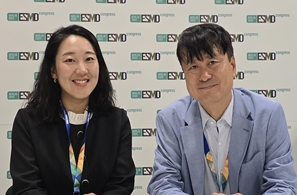- "Increasing role of Kisqali in breast cancer therapy"
- by Whang, byung-woo | translator Hong, Ji Yeon | Feb 24, 2025 05:51am
The introduction of a new treatment option has been positively evaluated because the existing endocrine therapy, which is used as first-line treatment for HR+/HER2 advanced and metastatic breast cancer, accompanies specific adverse responses, such as thrombosis and musculoskeletal adverse reactions associated with estrogen deprivation.

The number of breast cancer patients in South Korea has been increasing for the past five years, from 2018 to 2023. HR+/HER2- breast cancer type accounts for approximately 60-70% of all metastatic breast cancer.
Currently, the five-year survival rate of patients with early breast cancer is high, at over 90%, but the survival rate of patients with metastatic breast cancer is reported to be very low.
Dr. Jeong said, "Despite the high overall survival rate for breast cancer, the five-year survival rate is only 32% when diagnosed as advanced‧metastatic breast cancer." Adding, "Difficult-to-treat cases often include existing multiple metastasis from diagnosis. When patients show resistance to first-line treatment, cancer progression becomes rapid, and patients have poor prognosis."
"Advanced‧metastatic breast cancer has difficult remission and can easily relapse. Thus, the treatment goal is to consider the tumor characteristics, minimize side effects, and extend the progression-free survival (PFS) and overall survival," Dr. Jeong Said. "When establishing a treatment strategy, menopause, cancer progression, internal organ metastasis, and patient's overall health status must be considered."
According to Dr. Jeong, the global guidelines (NCCN, ASCO, ESMO) recommend combination therapy containing endocrine therapy and CDK4/6 inhibitor as a first-line treatment for HR+/HER2- advanced breast cancer. A therapy with CDK4/6 inhibitor is recommended first instead of a cytotoxic anticancer agent for aggressive disease type."
"The introduction of CDK4/6 inhibitors changed a paradigm for HR+/HER2- breast cancer"
Data on CDK4/6 inhibitors for HR+/HER2- breast cancer have been competitively presented.
Kisqali (ribociclib)'s 'RIGHT Choic subgroup study' results presented at the San Antonio Breast Cancer Symposium (SAVCS 2024) have gained attention.
Based on the RIGHT Choice clinical study and the subgroup study, the clinical utility of Kisqali has been confirmed for HR+/HER2- breast cancer patients with internal organ metastasis and aggressive characteristics.
In the study, endocrine therapy in combination with Kisqali demonstrated improved the median progression-free survival (mPFS) in various subtypes of HR+/HER2- advanced metastatic‧breast cancer than a combination therapy with chemotherapy.
Dr. Jeong mentioned regarding this, "When a disease shows aggressive characteristics, chemotherapy, rather than endocrine therapy, is typically widely used in clinical practices. Thus, the results of the RIGHT Choice study hold significant importance."
"Breast cancer is not a single type of disease and includes different tumors with various clinical characteristics and show different responses to disease progression and treatments. Depending on these groups, the analysis of the RIGHT Choice study showed that long PFS in the Kisqali combination therapy group," Dr. Jeong said.
Dr. Jeong believes that more studies like these will enable customized treatments, allowing patients to receive appropriate treatment.
Based on three Phase 3 clinical studies, including the NALEESA-2,3,7 study, Kisqali was confirmed to have consistent improvement to overall survival regardless of menopause status, treatment number, and combined treatment in advanced‧metastasis breast cancer patients. These study results will likely yield synergy.
"Kisqali demonstrated benefits in OS survival through three clinical studies, where the quality of life was maintained and improved, regardless of the existence of combined treatments, the number of treatments, menopause status, metastasis location and number," Dr. Jeong said. "The effectiveness of Kisqali was confirmed in premenopausal patients, extending the treatment paradigm."
"Changes to breast cancer treatment option…time to consider patient access"
In addition to the global clinical study, the efficacy result of Kisqali from the real-world setting in South Korea was presented at the 2024 ESMO ASIA. Likewise, Kisqali's effect has been demonstrated in clinical settings.
Dr. Jeong explains that no significant safety-related issues have not been reported for Kisqali, other than general side effects like fatigue and rashes, when prescribed. Compared to clinical studies, these side effects are manageable.
"Considering a high percentage of premenopausal patients, Kisqali offers a benefit for use regardless of the menopause status. Effects and safety of Kisqali were demonstrated in these patient groups, and it has become a new standard therapy," Dr. Jeong said.
"Furthermore, Kisqali has the advantage of increasing patient adherence because it offers convenience in dosage changes and administration guidance," Dr. Jeong said. "It is possible to change the dosage with the same formulation by changing the number of tablets. Given that a system to reduce re-purchase burden when changing a dosage has been introduced, the drug is gaining a positive review in clinical settings."
However, Dr. Jeong says that expanded reimbursement standard is crucial to ensure patients to benefit from these new drugs. The introduction of CDK4/6 inhibitors has robustly changed the treatment paradigm for HR+/HER2- advanced‧metastatic breast cancer treatment. Thus, it is necessary to strengthen new drug access.
Dr. Jeong said, "As better treatment options are available for not only HR+/HER2- metastatic breast cancer but also other types of metastatic breast cancer, positive changes have been brought. To improve treatment settings for HR+/HER2- advanced‧ metastatic breast cancer in South Korea, expanded National Health Insurance reimbursement standard and strengthened new drug access are needed."
Ultimately, Dr. Jeong said, "It is important to improve patient access to new treatment options through securing medical facilities and expanding clinical study participation." "Accumulating clinical data that reflects the characteristics of Korean patients is important for establishing a foundation that can influence global guidelines."
-

- 0
댓글 운영방식은
댓글은 실명게재와 익명게재 방식이 있으며, 실명은 이름과 아이디가 노출됩니다. 익명은 필명으로 등록 가능하며, 대댓글은 익명으로 등록 가능합니다.
댓글 노출방식은
댓글 명예자문위원(팜-코니언-필기모양 아이콘)으로 위촉된 데일리팜 회원의 댓글은 ‘게시판형 보기’와 ’펼쳐보기형’ 리스트에서 항상 최상단에 노출됩니다. 새로운 댓글을 올리는 일반회원은 ‘게시판형’과 ‘펼쳐보기형’ 모두 팜코니언 회원이 쓴 댓글의 하단에 실시간 노출됩니다.
댓글의 삭제 기준은
다음의 경우 사전 통보없이 삭제하고 아이디 이용정지 또는 영구 가입제한이 될 수도 있습니다.
-
저작권·인격권 등 타인의 권리를 침해하는 경우
상용 프로그램의 등록과 게재, 배포를 안내하는 게시물
타인 또는 제3자의 저작권 및 기타 권리를 침해한 내용을 담은 게시물
-
근거 없는 비방·명예를 훼손하는 게시물
특정 이용자 및 개인에 대한 인신 공격적인 내용의 글 및 직접적인 욕설이 사용된 경우
특정 지역 및 종교간의 감정대립을 조장하는 내용
사실 확인이 안된 소문을 유포 시키는 경우
욕설과 비어, 속어를 담은 내용
정당법 및 공직선거법, 관계 법령에 저촉되는 경우(선관위 요청 시 즉시 삭제)
특정 지역이나 단체를 비하하는 경우
특정인의 명예를 훼손하여 해당인이 삭제를 요청하는 경우
특정인의 개인정보(주민등록번호, 전화, 상세주소 등)를 무단으로 게시하는 경우
타인의 ID 혹은 닉네임을 도용하는 경우
-
게시판 특성상 제한되는 내용
서비스 주제와 맞지 않는 내용의 글을 게재한 경우
동일 내용의 연속 게재 및 여러 기사에 중복 게재한 경우
부분적으로 변경하여 반복 게재하는 경우도 포함
제목과 관련 없는 내용의 게시물, 제목과 본문이 무관한 경우
돈벌기 및 직·간접 상업적 목적의 내용이 포함된 게시물
게시물 읽기 유도 등을 위해 내용과 무관한 제목을 사용한 경우
-
수사기관 등의 공식적인 요청이 있는 경우
-
기타사항
각 서비스의 필요성에 따라 미리 공지한 경우
기타 법률에 저촉되는 정보 게재를 목적으로 할 경우
기타 원만한 운영을 위해 운영자가 필요하다고 판단되는 내용
-
사실 관계 확인 후 삭제
저작권자로부터 허락받지 않은 내용을 무단 게재, 복제, 배포하는 경우
타인의 초상권을 침해하거나 개인정보를 유출하는 경우
당사에 제공한 이용자의 정보가 허위인 경우 (타인의 ID, 비밀번호 도용 등)
※이상의 내용중 일부 사항에 적용될 경우 이용약관 및 관련 법률에 의해 제재를 받으실 수도 있으며, 민·형사상 처벌을 받을 수도 있습니다.
※위에 명시되지 않은 내용이더라도 불법적인 내용으로 판단되거나 데일리팜 서비스에 바람직하지 않다고 판단되는 경우는 선 조치 이후 본 관리 기준을 수정 공시하겠습니다.
※기타 문의 사항은 데일리팜 운영자에게 연락주십시오. 메일 주소는 dailypharm@dailypharm.com입니다.









